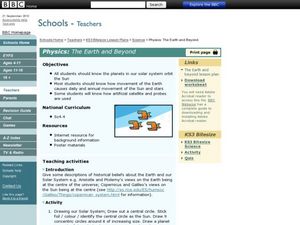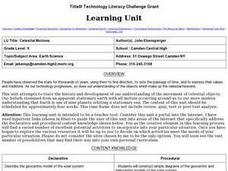Curated OER
Asteroids Between Mars and the Sun
In this asteroids of the solar system activity, students observe a diagram showing all the minor planets found in the orbit of Mars. Students answer 4 questions about the minor planets inside the orbit of other planets, they find the...
Laboratory for Atmospheric and Space Physics
Planetary Distances on the Playground
There's no need to stay inside; get out of the classroom and create a scaled map of the solar system on your playground field! In collaborative groups, scholars identify the distance between the sun and other planets, place planet...
Curated OER
Nebular Theory-Origin of the Solar System
For this Nebular Theory worksheet, students are given diagrams of the stages that occurred in the formation of the solar system. They order the diagrams based on the occurrences of each event and answer twelve questions about the Nebular...
Curated OER
Exploring Our Solar System #1
Students examine the different theories on how our solar system was formed. They discover the order of the nine planets. They also identify the surface features of each planet.
Glynn County School System
Our Sun
The sun is responsible for almost 99 percent of the solar system's mass. As an essential part of our lives, the sun has many important features. A PowerPoint lesson presents information about features such as sunspots, the magnetic...
University of Colorado
Modeling Sizes of Planets
The density of the huge planet of Saturn is 0.7 g/cm3, which means it could float in water! In the second part of 22, science pupils explore the size and order of the planets. They then calculate weight and/or gravity and density of...
Laboratory for Atmospheric and Space Physics
Space Travel Guide
Looking to take a trip? Why not go to space? Here, scholars take on the role as travel agent to create a guide to their favorite planet including travel tips and sightseeing recommendations.
Teach Engineering
Manned Mission to Mars
To go or to not to go — the question for a mission to Mars. This resource provides details for a possible manned mission to Mars. Details include a launch schedule, what life would be like on the surface, and how the astronauts would...
Curated OER
Inner Planets
Learners research characteristics of the planets and record their findings on Planet Web worksheet. They create fold paper to create a foldable booklet to display the information they discover about the planets.
Curated OER
The Discovery of the Solar System
Students explain the observed motion of the planets. The inner ones move back-and-forth across the position of the Sun, while the outer ones usually advance in one direction, but with occasional temporary reversals known as "retrograde...
Curated OER
Astronomical Data
In this astronomy worksheet, students use a chart with planetary data comparing the inner planets to each other. Students will use the period of rotation, period of revolution, and distance from the sun for these inner planets to...
Curated OER
Try This On For Size!
Students view a video to gather information about our solar system. They create models of the planets to scale and place them in scale relative to their distances from the sun. They also visit a planetarium or use the internet to gather...
Curated OER
Physics The Earth and Beyond
Fourth graders will explore our solar system. In this physics instructional activity students create a model of the solar system to explore the movement of Earth, the Sun, and stars.
Curated OER
Models of Planets
In this planet models worksheet, students use the radius of a given planet and its mass to answer questions using a model of a planet with a given radius. They determine the volume of the planet's inner core, the volume of its outer...
Curated OER
Celestial Motions
Ninth graders complete a unit of lessons on the history of our knowledge of celestial objects. They conduct Internet research, plot the motion of a planet, construct a model of the sun's apparent motions, and create diagrams of the solar...
Curated OER
The Inner Planets
For this planets worksheet, students review the characteristics of the inner planets: Mars, Venus, Earth, and Mercury. This worksheet has 15 multiple choice questions.
Curated OER
Interplanetary Distance and Travel Time
Students are introduced to the challenges involved in understanding the space travel distances and the time involved to do so through the use of an interactive fable. The modeling and comparisons deal with specific distances at different...
Scholastic
Lesson One: The Earth, Background and Glossary
How much do you really know about our planet? Middle schoolers build up their prior knowledge about Earth, its placement in the solar system, its composition, and important geological vocabulary with an introductory earth science lesson.
Laboratory for Atmospheric and Space Physics
Where Are We Going?
Come take a ride on the space bus! Scholars go on an imaginary trip to pick up their peers from the inner and outer planets while reinforcing math skills. First, learners round decimals to identify each planets' distance from Earth....
Curated OER
What's "Out" There?
First graders investigate the five outer planets. In this space science lesson, 1st graders read the book Our Solar System and identify the five outer planets. Students create a booklet and write about outer planets.
Curated OER
Our Solar System to Scale
Middle schoolers calculate the diameter of planets and their relative distances. In this space science lesson, students discover how small or big the planets are in comparison to each other. Middle schoolers use cross multiplying...
Curated OER
Bellwork for Week 19-Electromagnetic Spectrum and Planets
For this bellwork on the electromagnetic spectrum and planets worksheet, learners answer questions about the information determined using a spectroscope, the geocentric and heliocentric models of planet rotation and the planets.
Curated OER
The Discovery of the Solar System
Pupils study the ideas behind the heliocentric theory of Copernicus. They examine about retrograde motion of the planets as they move around the sun. They study astronomers who include Ptolemy, Copernicus, and Galileo.
T. Smith Publishing
Earth
Young astronomers read an informational text passage and then answer questions based on what they read.

























